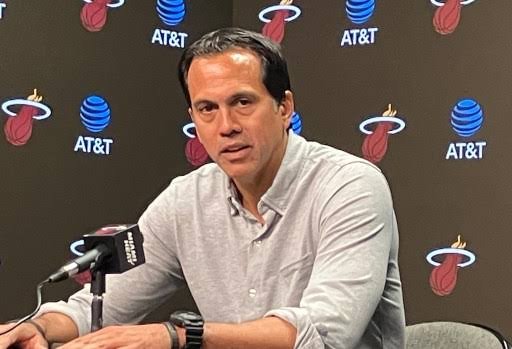Erik Spoelstra’s Departure: A New Chapter Beyond Financial Incentives
Erik Spoelstra, the esteemed head coach of the Miami Heat, has been a cornerstone of the team’s success for over a decade. His recent decision to withdraw from his role, despite financial stability, has sparked considerable interest and speculation. This article delves into the potential reasons behind Spoelstra’s departure, offering insights into the complexities of professional sports leadership and personal fulfillment.
#### **The Legacy of Erik Spoelstra**
Erik Spoelstra’s tenure with the Miami Heat has been marked by significant achievements. Under his leadership, the Heat secured two NBA championships (2012 and 2013) and consistently demonstrated resilience and strategic prowess. Spoelstra’s coaching philosophy and adaptability have not only led to on-court success but also fostered a culture of excellence within the organization.
Spoelstra, who started his career with the Heat as a video coordinator, rose through the ranks to become the team’s head coach. His ascent is a testament to his dedication, work ethic, and basketball acumen. His departure, therefore, is not a decision made lightly or due to financial concerns, which makes the reasoning behind it all the more intriguing.
#### **The Complexity of Professional Sports Careers**
Professional sports careers, particularly those at the helm of high-profile teams like the Miami Heat, are multifaceted. While financial compensation is an important aspect, it often takes a backseat to other factors such as personal fulfillment, professional growth, and work-life balance. For Spoelstra, the decision to leave the Heat likely involves a complex interplay of these elements.
#### **Personal Fulfillment and Growth**
For many successful professionals, personal fulfillment becomes a crucial factor in career decisions. Spoelstra’s commitment to the Heat has been unwavering, but even the most passionate individuals require periods of reflection and change. The pursuit of new challenges or the need for personal growth can drive such significant decisions.
Spoelstra may have reached a point where he felt that his journey with the Heat had come full circle. Despite his success, there might be a desire to explore new opportunities, whether within the realm of coaching, front-office roles, or even outside the sports industry. This quest for growth and new challenges is a common theme among individuals who have achieved significant milestones in their careers.
#### **The Impact of Work-Life Balance**
The demanding nature of a head coaching position in the NBA often comes at a cost to personal life. The intense schedule, constant travel, and high-pressure environment can take a toll on personal well-being and family life. Spoelstra’s decision to step away might reflect a need to recalibrate and focus on achieving a healthier work-life balance.
Maintaining a successful career while ensuring personal happiness and family well-being is a delicate balance. For Spoelstra, who has been deeply committed to his role, taking a step back to reassess his priorities could be a crucial move in achieving long-term satisfaction and overall well-being.
#### **The Role of Organizational Dynamics**
The dynamics within a sports organization can also play a significant role in such decisions. Organizational changes, evolving team dynamics, or shifts in ownership and management can influence a coach’s decision to stay or leave. While the Miami Heat has been a stable and successful organization under Spoelstra’s leadership, external factors or internal changes might have contributed to his decision to step away.
In professional sports, the alignment between a coach’s vision and the organization’s direction is crucial. If there are misalignments or differing priorities, it can lead to tough decisions regarding the future. Spoelstra’s departure might signify a strategic or philosophical divergence that prompted him to seek new opportunities elsewhere.
#### **Legacy and Future Aspirations**
Leaving behind a successful tenure is never easy, especially for someone like Spoelstra who has had a profound impact on the team and its culture. However, his departure could also signal a new beginning or an opportunity to leave a lasting legacy in a different context. Spoelstra’s future aspirations might involve contributing to the sport in innovative ways or pursuing other ventures that align with his passions and goals.
**Conclusion**
Erik Spoelstra’s decision to withdraw from his role with the Miami Heat, despite financial stability, underscores the complex nature of career decisions in professional sports. His departure is not merely a financial consideration but a reflection of deeper personal and professional motivations. As Spoelstra embarks on this new chapter, his legacy with the Heat remains intact, and his future endeavors will undoubtedly continue to influence the world of basketball and beyond.
In the end, Spoelstra’s story serves as a reminder that career decisions are often driven by a confluence of factors, including personal growth, work-life balance, and the pursuit of new challenges. His journey reflects the broader narrative of professional life, where success is not solely measured by financial rewards but by the fulfillment and impact one achieves along the way.
